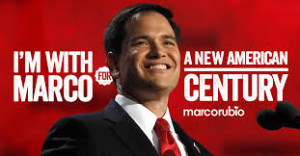di Alia K. Nardini
 Le luci si spengono su Marco Rubio, il Senatore della Florida che solo qualche mese fa si prospettava all’orizzonte come l’astro nascente del Grand Old Party, un nuovo Ronald Reagan. Il giovane candidato Repubblicano di origini cubane, che aveva scommesso tutto sul voto nel suo Stato d’origine, ieri si è piazzato secondo con il 27% dei voti a grande distanza da Donald Trump, che invece ha ottenuto tutti i 99 delegati in palio in questo appuntamento elettorale, conquistando il 45,7% delle preferenze. Ted Cruz, terzo, ha in realtà ottenuto un buon risultato con il 17%.
Le luci si spengono su Marco Rubio, il Senatore della Florida che solo qualche mese fa si prospettava all’orizzonte come l’astro nascente del Grand Old Party, un nuovo Ronald Reagan. Il giovane candidato Repubblicano di origini cubane, che aveva scommesso tutto sul voto nel suo Stato d’origine, ieri si è piazzato secondo con il 27% dei voti a grande distanza da Donald Trump, che invece ha ottenuto tutti i 99 delegati in palio in questo appuntamento elettorale, conquistando il 45,7% delle preferenze. Ted Cruz, terzo, ha in realtà ottenuto un buon risultato con il 17%.
Il fenomeno Trump appare inarrestabile. Con al suo attivo 20 vittorie, il magnate seguita ad infiammare le platee dei suoi comizi, mietendo un successo dopo l’altro. Nell’appuntamento elettorale del 15 marzo, conquista – oltre alla Florida – anche Illinois, Missouri e North Carolina. Ted Cruz segue a stretta distanza, non scendendo mai al di sotto del 30%. È peraltro un ottimo risultato per il Senatore del Texas ed il suo staff: ad oggi, Cruz appare l’unico candidato in grado di proporsi come alternativa credibile a Trump. Come previsto dai sondaggi, John Kasich vince nello Stato in cui è Governatore, l’Ohio, e con il 46,8% delle preferenze si aggiudica la posta in gioco di 66 delegati. È un risultato accettabile: abbastanza da restare in corsa, anche se molto probabilmente non sufficiente per vincere la sfida alla presidenza. Trump ha ora 661 delegati, più della metà dei 1.273 necessari ad ottenere la nomination; Cruz ne conta 406, mentre Kasich è solo a quota 142.
La strada è ora tutta in salita per il Grand Old Party, che vede a malincuore il sostegno per l’uomo d’affari newyorchese allargarsi e radicarsi tra le fasce più diverse della popolazione: piccoli imprenditori, studenti universitari, evangelici, operai, indipendenti. E se la tentazione è quella di seguire gli ex aspiranti alla nomination Chris Christie e Ben Carson, e concedere il tanto sospirato endorsement, il GOP tentenna. Nei prossimi mesi, il Grand Old Party dovrà lavorare duramente per mantenere credibilità ed efficienza al Congresso. E se lo stile irriverente e impetuoso di Trump piace agli americani che hanno perso fiducia nella politica, i sondaggi vedono l’uomo d’affari newyorchese ancora in netto svantaggio in un testa a testa con Hillary. In un’ottica sistemica, i Repubblicani temono inoltre che Trump radicalizzi le posizioni interne al partito su temi complessi come l’immigrazione, la regolamentazione del capitalismo e il ruolo dell’America nel mondo. Qualunque cosa accada, la sensazione è che Trump stia cambiando radicalmente il partito, così come le regole della politica in generale.
Sul fronte Democratico, Hillary Clinton consolida il proprio vantaggio dopo la sconfitta a sorpresa dell’8 marzo in Michigan. L’ex Segretario di Stato riporta una solida vittoria in Florida e North Carolina, aggiudicandosi anche Illinois, Ohio e – per una manciata di voti – il Missouri. Hillary Clinton ha ora 1.139 delegati, Sanders 825: un vantaggio notevole, che diventa sorprendente contando anche i superdelegati, ovvero gli esponenti di punta del partito, governatori e membri del Congresso. Con un conteggio finale di 1.606 delegati contro gli 851 di Sanders, appare quasi certo che sarà Hillary Clinton a sfidare i Repubblicani a novembre.
Il Senatore del Vermont non sembra tuttavia voler abbandonare la corsa, dimostrandosi ottimista sulle possibilità di ampliare il proprio consenso nei prossimi mesi oltre all’elettorato giovane, bianco e liberale. In aggiunta, un recente sondaggio rivela che il 33% dei sostenitori di Sanders si rifiuterà di votare per Hillary Clinton alle presidenziali di novembre, nel caso il Senatore del Vermont scelga do non sostenere la candidatura dell’ex Segretario di Stato. Non si tratta di buone notizie per il partito Democratico, che sembra affrontare anch’esso profonde divisioni interne – sebbene non dell’entità di quelle del Grand Old Party. E se Clinton non intende seguire le orme dei Repubblicani, sottovalutando l’entusiasmo degli elettori nei confronti di Donald Trump, l’ex Segretario di Stato rivolge ancora una volta la sua attenzione all’uomo d’affari newyorchese, accusandolo di mettere in imbarazzo l’America con la sua retorica divisiva, e di isolarla a livello internazionale.
* * *
 The road has ended for Marco Rubio, the Florida Senator who only a few months ago appeared as the Grand Old Party’s rising star, having once been described as the new Ronald Reagan. The young Republican senator of Cuban origins put his race on the line, dependent on the vote in his home State of Florida yesterday: instead, he came second with 27% of the votes. Donald Trump, however, achieved yet another victory, amassing all the 99 delegates at stake with a staggering 45.7% of the preferences. Ted Cruz followed at 17%.
The road has ended for Marco Rubio, the Florida Senator who only a few months ago appeared as the Grand Old Party’s rising star, having once been described as the new Ronald Reagan. The young Republican senator of Cuban origins put his race on the line, dependent on the vote in his home State of Florida yesterday: instead, he came second with 27% of the votes. Donald Trump, however, achieved yet another victory, amassing all the 99 delegates at stake with a staggering 45.7% of the preferences. Ted Cruz followed at 17%.
Trump’s momentum appears now unstoppable. With 20 victories to his credit, the tycoon still fires up his audiences around the country, and the momentum is still growing. In the March 15 election, besides Florida, he won Illinois, Missouri and North Carolina hovering well above 40% of the preferences. Ted Cruz followed closely, with over 30% in all States. This is a tremendous outcome for the Texas Senator and his campaign staff. Today, Cruz appears as the only candidate who could mount a credible challenge to Donald Trump. As predicted by the polls, John Kasich won only in his gubernatorial State of Ohio: with 46.8% of the preferences, he acquired all 66 delegates at stake. It is an acceptable result: good enough to stay in the race, although most likely not sufficient to challenge Trump on the road to the nomination. Trump has now 661 delegates, more than half of the 1,273 he needs to secure his party’s support at the Republican convention in Cleveland. Cruz has 406, while Kasich only totals 142.
The battle continues to head uphill for the Grand Old Party, as it reluctantly watches support for the New York businessman further manifest among very diverse groups: college students, deluded Democrats, blue collar workers, evangelicals, small entrepreneurs. For many Americans there is an unrelenting temptation to follow the steps of former candidates Chris Christie and Ben Carson, and grant Trump a long-awaited endorsement. But the GOP hesitates. If Trump’s brash style and inflammatory rhetoric appeals to Americans who have lost their faith in politics, the New York businessman still polls negatively in a potentially direct challenge against Hillary Clinton, who leads in almost every State against the New York businessman. In a broader optic, Republicans also fear that Trump may radicalize the party internally on many complex issues, ranging from immigration, to the responsibilities of capitalism, and America’s role in the world. Whatever happens, the feeling is that Trump is radically changing the party from within, and the course of American politics. It is too late to stop Trump, and things will never be the same after his candidacy.
On the Democratic front, Hillary Clinton consolidates her lead after her unexpected defeat on March 8th in Michigan. The former Secretary of State locked down a decisive victory in Florida and North Carolina, also winning Illinois, Ohio and – for a handful of votes – Missouri. Clinton has now 1,139 delegates, while Sanders trails with 825. When also accounting for the superdelegates, Hilary leads with a final count of 1,606 against Sanders’ 851 delegates, Hillary Clinton appears almost certainly to be the one to challenge her Republican opponent in the November 8th presidential elections.
The Vermont Senator, however, does not seem to be considering the option of dropping out of the race. Sanders confirms his optimistic disposition, looking at the possibility of expanding his voter base beyond white, young liberals in the coming months. Furthermore, a recent survey revealed that 33% of Sanders’ supporters will refuse to vote for Hillary Clinton in November, should the Vermont Senator choose not to endorse her candidacy. This is bad news for the Democratic Party, which also seems to face internal divisions – albeit not as profound as the GOP. And while Clinton does not intend to follow the footsteps of the GOP and underestimate current momentum behind Donald Trump, the former Secretary of State turns her attention to the New York businessman once again, accusing him of embarrassing America with his aggressive demeanor, which could pose a serious threat to the country on an international level.
* Verso la nomination / Racing towards the nominations
* Iowa: prima vittoria per Cruz e Clinton / Iowa: first victory for Cruz and Clinton
* Il New Hampshire e la corsa alla presidenza / New Hampshire and the White House Race







Lascia un commento